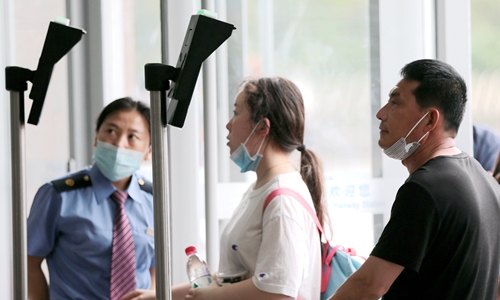China's CDC advises Chinese nationals to avoid unnecessary overseas travel during National Day holidays

A passenger scans an ID card at a train station in Xi'an, capital of Southwest China's Shaanxi Province, on Monday. The Xi'an subsidiary of China Railway launched e-tickets over the weekend to make travel more convenient. Photo: CNSphoto
As COVID-19 cases continue to surge globally, the Chinese Center for Disease Control and Prevention (CDC) called for Chinese people to avoid unnecessary outbound travel during the upcoming Mid-Autumn Festival and National Day holidays in newly-issued guidelines.
China is requiring all outbound travellers to undergo a 14-day isolation upon their arrival. Cross-border travelers may therefore be required to spend a total of 28 days in quarantine, if their destination also requires a 14-day isolation period, which will seriously impact their travel experience, the center said.
The CDC also reminded people to be wary of contracting norovirus — a highly contagious intestinal disease that could be caused by food poisoning — during the upcoming holidays as gatherings and eating out become more common, urging people to pay attention to food hygiene, wash their hands frequently and avoid eating uncooked food.
People can arrange domestic travel as normal, however, as all cities on the Chinese mainland are low-risk areas for the coronavirus currently, the CDC said. It reminded travelers to prevent the possible spread of the coronavirus while traveling by abiding by the relevant epidemic control measures of destination cities.
It also recommended people avoid going to closed and crowded places, reduce their contact with large gatherings, be aware of social distancing, and wash their hands frequently.
Wearing a mask on transportation services like flights and trains is also recommended.
Moreover, people should take hand-washing disinfectants, disinfectant wipes, masks and other epidemic control supplies with them throughout their journeys.
When travelers experience a fever or other disease-like symptoms that make them unsuitable for travel, they should go and see a doctor immediately and postpone or cancel their travel plans, the center said.
After returning from travel, people should continue to monitor their personal health by themselves for the next 14 days, and seek medical advice if they feel unwell and inform their doctors of their relevant travel history.
Inbound travelers will be required to take nucleic acid tests both upon arrival at customs and during their 14-day isolation at designated places and home, the center said.
The Chinese mainland has not reported any local confirmed cases or asymptomatic infections since August 21, and has been a low-risk area since August 29. The pandemic overseas, however, is still ongoing.
The Americas still remain the most severely affected area in the world, despite the number of newly reported cases decreasing. The number of new cases reported every week is about half of the global number, the center said.
Southeast Asia has the fastest growth rate of the epidemic, and the number of newly reported cases each week will exceed that of the Americas, it said.
The pandemic situation in Europe worsens again after a slight decline in May and June. Seasonal religious and cultural gatherings, wedding celebrations, and other social events have most likely caused the rise in the eastern Mediterranean region.
Meanwhile, the western Pacific region has the lowest cumulative number of confirmed cases and deaths per million in the world, and its recent outbreak has been relatively stable. Africa has shown a downward trend since the end of July, it said.

